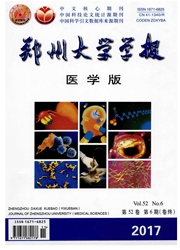

 中文摘要:
中文摘要:
目的:探讨细菌鞭毛蛋白对溃疡性结肠炎(UC)的致病作用。方法:选取UC患者60例,其中中、重度UC患者30例,轻度UC患者30例。30例健康志愿者取血清样本作对照,15例结肠癌行外科手术切除的正常结肠断端取正常结肠组织作对照。采用ELISA方法检测外周血中细菌鞭毛蛋白抗体,免疫组织化学SABC法检测结肠黏膜上皮细胞中细菌鞭毛蛋白的表达。结果:各组血清中细菌鞭毛蛋白抗体水平和结肠上皮中细菌鞭毛蛋白的表达差异有统计学意义(F/χ~2=13.570和11.553,P〈0.05),UC患者高于对照者,重度UC患者高于中度UC患者。结论:细菌鞭毛蛋白可能参与了UC的发生发展过程。
 英文摘要:
英文摘要:
Aim:To detect the pathogenic role of bacterial flagellin protein in ulcerative colitis(UC). Methods:A total of 60 initially active UC patients were chosen, among which,30 patients were moderate to severe UC, and 30 patients were mild UC. Their peripheral blood and colon mucosa were collected. The colon mucosa tissues from 15 cancer patients were collected as tissue control ,blood samples from 30 healthy volunteers were collected as serum control. Bacterial flagellin protein in serum and the colon mucosa were detected by ELISA and immunohistochemistry, respectively. Results:The bacterial flagellin anti- body and protein in moderate to severe UC group and mild UC group had signifieant differences and those in moderate to se- vere UC group and control group also had significant differences. While the same to mild UC group and control group( F/X^2 = 13. 570 and 11. 553 ,P 〈0.05). Conclusion :The baeterial flagellin protein may be involved in the pathogenesis of UC.
 同期刊论文项目
同期刊论文项目
 同项目期刊论文
同项目期刊论文
 期刊信息
期刊信息
